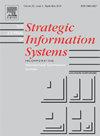SISP as practice: De-isolating SISP activity across multiple levels
Abstract
The strategic information systems planning (SISP) literature has retained a narrow focus on organizational level activity to date. Limited empirical research has explored SISP’s multi-level interlinkages and complexities. Studies that have attempted to explore the micro activity of strategizing via a practice-based perspective have had their significance to academic and practitioner audiences questioned on grounds of micro-isolationism. Using a strategy as practice (SAP) lens, this study investigates how senior managers practice SISP through case studies of two public sector organizations (PSOs). The research’s primary contribution is a multi-level framework representing the practice of SISP. We ‘de-isolate’ SISP activity by empirically revealing how it is linked across macro, meso, and micro levels by SISP’s practitioners. Relating seemingly mundane strategic activity to matters of consequence has proven an enduring issue. Yet, at a time when organizations are facing grand challenges of increasing frequency and scale, we argue that the situating of day-to-day information systems (IS) strategy work within its broader context has never been more important. We propose a future research agenda premised upon moving ‘upstream’ to position SISP relative to grand challenges and ‘downstream’ to capture more open and inclusive forms of SISP.

 求助内容:
求助内容: 应助结果提醒方式:
应助结果提醒方式:


